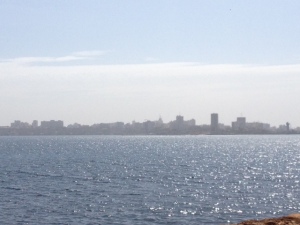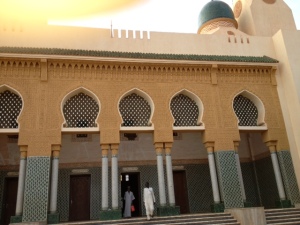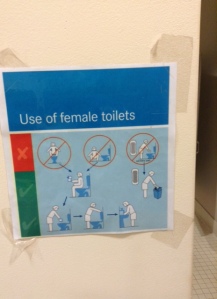PRISM Africa Issue Released
My former boss, who was cool enough to give me the long leash required to do the TSCTP Study when I was at the Center for Complex Operations, just released PRISM Volume 5, Number 2. This issue is the journal’s first African security-focused one, and includes the following articles:
- The Tswalu Dialog by Michael Miklaucic
- On the State of Peace and Security in Africa by Olusegun Obasanjo
- Emerging Risks and Opportunities in Sub-Saharan Africa: Implications for the American Agenda of Peace and Security, Democracy and Governance, Economic Growth and Development by Jeffrey Herbst & Greg Mills
- Security Threats Facing Africa and its Capacity to Respond by Paul Collier
- Shaping Africa’s Peace and Security Partnerships for the 21st Century by Amanda Dory
- Upcoming Inflection Point by Phillip Carter & Ryan Guard
- The Recurrent Security Crises in Mali and the Role of the African Union by Pierre Buyoya
- Dynamics of Conflict Management in the Democratic Republic of the Congo;
Malawi and the Force Intervention Brigade by Clement Namangale - Somaliland: Where there has been Conflict but no Intervention by Rakiya Omaar & Saeed Mohamoud
- Lessons from Colombia for Fighting the Boko Haram Insurgency in Nigeria by Afeikhena Jerome
- The African Development Bank’s Support to Post Conflict States by Sunita Pitamber
- The Soldier and the Street by Marie Besançon & Stephen Dalzell
The Trans Sahara Counter Terrorism Partnership: Building Partner Capacity to Counter Terrorism and Violent Extremism in the Sahel & Maghreb
A few months ago, I published the study I had been working on during my IPA Assignment at the Center for Complex Operations at National Defense University – The Trans Sahara Counter Terrorism Partnership – Building Partner Capacity to Counter Terrorism and Violent Extremism. The study discusses the origins of TSCTP, which is rather unique by U.S. government standards, for its regional and interagency focus . It dissects the “anatomy” of the program (including which U.S. government agencies are involved, what their roles are, and who their partner nation counterparts are), and derives six functional areas of TSCTP engagement in order to better understand the program’s lines of effort across the various agencies. These are: Military Capacity-Building, Law Enforcement Anti-Terrorism Capacity-Building, Justice Sector Counterterrorism Capacity-Building, Public Diplomacy and Information Operations, Community Engagement, and Vocational Training. The study then discusses some of the planning and implementation challenges associated with a program of this nature, derived from the over 70 interviews I conducted across the interagency and in nine of the ten TSCTP countries (Algeria, Burkina Faso, Chad, Mali, Mauritania, Morocco, Niger, Nigeria, and Senegal) last year.
The study contains a lot of information on TSCTP, but as it’s rather dense, I also published a handful of shorter articles that either summarize or draw out some of the more salient points of the larger study:
- Catch-22 in the Sahel in the National Interest
- Nine Questions about the Trans Sahara Counter Terrorism Partnership you were too Embarrassed to Ask in War on the Rocks
- North and West Africa Seek to Jumpstart Regional Counterterrorism Cooperation in World Politics Review
Happy reading!
Return to the Mothership
Yesterday was my first day back at CNA, the place I’ve affectionately called “The Mothership” for the past fifteen months of my assignment at the Center for Complex Operations. While at CCO, I was working on an analysis of the Trans Sahara Counter Terrorism Partnership (TSCTP), which is an interagency U.S. government program to counter terrorism and violent extremism in the Maghreb and Sahel. I’m hoping my report will be published by the end of February – inshallah.
Working on this project, I learned a lot about the complexity of foreign assistance, and how much more I have yet to learn on the topic. I’m a very hands on learner, so fortunately I had to travel to nine of the ten TSCTP countries. At the time I traveled, I’d accordingly code-named them for security reasons: African Country A (Niger), African Country B (Chad), African Country C (Mali), African Country D (Senegal), African Country E (Morocco), African Country F (Algeria), African Country G (Nigeria), African Country H (Mauritania), and African Country I (Burkina Faso).
Here’s a few pics from my travels & some blurbs about the kinds of things I got myself into when I wasn’t working.

View of the Niger River from my hotel room in Niamey

Niger Police Academy course

View of Dakar skyline from overloaded speedboat. When asked if the boat would make it back to Dakar, the guy driving said “On va essayer!” (We’re going to try!)

Riding a camel was on the bucket list, even though it’s très touristy. But I didn’t like the way this dude was looking at me.

I made my first tajine! It had chicken, peas, and artichokes. It was compellingly mediocre – but my teacher was not to blame.

The real reason my tajine was uninspiring was b/c THERE WERE KITTENS!!! I played with them instead of listening to the instructor.
Meeting the Demand for African-led, Internationally Supported Peace Interventions
The Africa Growth Initiative at Brookings has continued its tradition of asking its experts and colleagues to identify what they consider to be the key issues for Africa in the coming year in “Foresight Africa: Top Priorities for the Continent in 2014.” The format of the report is as follows (and includes a contribution from yours truly):
- Pushing the Employment Frontiers for Africa’s Rural and Urban Youth by John McArthur
- The Not-So-Jolly Roger: Dealing with Piracy off the Coast of Somalia and in the Gulf of Guinea by Vanda Felbab-Brown
- International Justice: The International Criminal Court and Africa by John Mukum Mbaku
- Africa’s Capital Market Appetite: Challenges and Opportunities for Financing Rapid and Sustained Growth by Vera Songwe
- The Post-2015 Development Agenda: What Are the Priorities For Africa? by Haroon Bhorat
- Leap-frogging in African Agriculture: The Case of Genetically Modified Crops by Calestous Juma and Katherine Gordon
- Shifts in Financing Sustainable Development: How Should Africa Adapt in 2014? by Amadou Sy
- Climate Change and Growth in Africa: Challenges and the Way Forward by Temesgen Deressa
- Harnessing Africa’s Emerging Partnerships by Mwangi Kimenyi
- Three Myths about African Industry by John Page
In my section on Meeting the Demand for African-led, Internationally Supported Peace Interventions, I argue call for regional and sub-regional organizations in Africa to better prepare their troops for rapid deployment in responding to escalating conflicts on the continent.
Following the release of the Foresight Africa Report, Brookings is hosting a discussion with leading Africa experts on the most important challenges the continent will face in 2014 on January 7 (today) from 10 to 1130am EST. You can register for the live webcast and join the conversation on Twitter using #ForesightAfrica.
Rumor has it Nigerian troops leaving Mali, MINUSMA
Yesterday, Nigeria’s The Guardian newspaper reported that President Goodluck Jonathan has ordered the withdrawal of Nigerian troops currently deployed to Mali. Nigerian troops initially entered Mali in January 2013 as part of the African-led International Support Mission to Mali (AFISMA), and had come under the command of the UN’s Multidimensional Integrated Stabilization Mission in Mali (MINUSMA), effective 1 July and authorized by UN Security Council Resolution 2100. With 4,684 troops currently participating in UN peacekeeping operations around the world, Nigeria is the third largest African contributor to such missions. In Mali in particular, as of mid-June, Nigeria had 991 troops in Mali (according to my numbers), meaning that one out of every six AFISMA soldiers came from Nigeria.
At this point, I’ve considered a few reasons that could be behind Nigeria’s motivation to withdraw from Mali:
- The first, and most likely reason Nigeria may pull out of Mali is the uptick in Boko Haram violence in northern Nigeria. In mid-May, President Jonathan declared a state of emergency in the northeastern states of Adamawa, Borno and Yobe, and the government believed that the progress of the security forces’ subsequent offensive was encouraging. However, Boko Haram’s continued attacks on soft targets in northern Nigeria, such as the pre-dawn attack on a secondary school in Yobe state earlier this month may have led the Nigerian government to reconsider its commitment in Mali.
- For a second reason Nigeria may be withdrawing from Mali, recall the criticisms levied against the Nigerian military in the fall of 2012 – just before its deployment to Mali. The Nigerian military was accused of being incapable of carrying out forward operations in Mali, to which the Nigerian government rebutted that the military had proper training for an engagement in Mali, but simply required funding and logistic support. Furthermore, as the most capable military in West Africa, Nigeria had previously been successful in restoring peace to Liberia and Sierra Leone. Truth be told, all ECOWAS troop contributing nations faced significant difficulties deploying troops to Mali, so pre-deployment challenges were not unique to Nigeria, but rather a common problem that afflicts many African deployments to peacekeeping missions.
- The third, and in my opinion, least likely reason is that Nigeria was slighted by the selection of Major General Jean Bosco Kazura of Rwanda as the MINUSMA Force Commander instead of Major General Shehu Adbulkadir from Nigeria, who had been the AFISMA force commander since January. If you had been following the debates surrounding the selection of the MINUSMA force commander closely, you might recall that there had been speculation of a competition between Nigeria and Chad for the position of MINUSMA force commander. Chadian President Idris Déby sought the position for Chad as recognition of the role that Chadian troops had played in the January-February offensive to clear northern Mali of Ansar Dine, MUJAO, AQIM, et al. Allegedly, in order to avoid choosing between Chad and Nigeria, the UN chose Kazura – a force commander from neither country who has the added benefit of being francophone. Again, this seems like the least likely motivation because, quite simply put, it seems petty.
Regardless of Nigeria’s motivation for potentially pulling its troops from Mali, I believe that the impact would have been worst if Nigeria had not deployed as part of AFISMA in the first place. If you think of French, Chadian, and AFISMA roles and missions in Mali since January in terms of “clear, hold, build” the French and the Chadians were the “clear” element, while the Nigerians as part of AFISMA were the “hold” element. (I don’t think we’re at the “build” stage as yet.) If Nigeria, as the seat of ECOWAS and the largest contributor to UN peacekeeping operations in ECOWAS, had not been part of that initial AFISMA deployment, it is unlikely that the force would have gotten off the ground in the first place. So yeah, it wouldn’t be great if the Nigerians end up pulling out of MINUSMA, but in my opinion, it could have been far worse had they not contributed to AFISMA in the first place.















You must be logged in to post a comment.